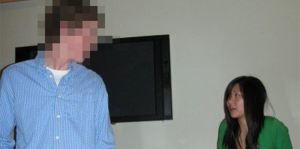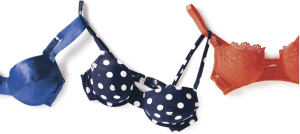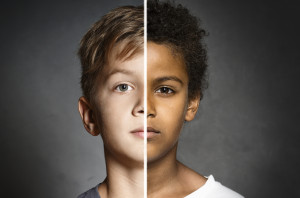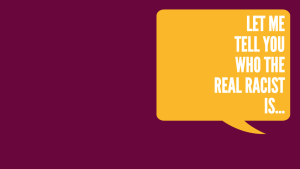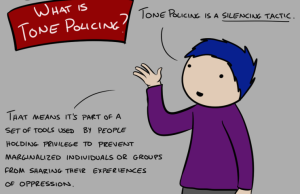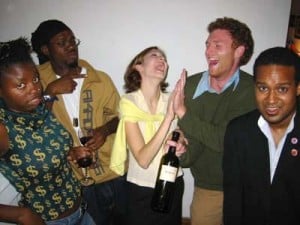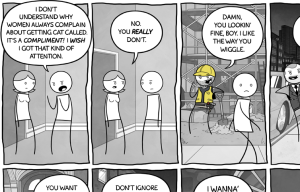
Source: Huffington Post
Originally published on Drunk Monkeys and republished here with their permission.
“You’ll find the one someday.”
So here I am.
Female. Asexual. Aromantic. Mid-thirties. Single. Child-free. Happy.
And some people I know are convinced that some of those descriptors don’t belong in the same sentence – especially that last one.
Gasp! You’re a mid-thirties woman with no partner and no kids, and you dare to call yourself happy? That doesn’t compute.
There is, in these people’s minds, a happiness recipe for which I lack vital ingredients.
They can still stomach a different version of the recipe as long as they believe I’m using appropriate substitutes; for instance, failing to have a boyfriend or husband at my age is permissible if I’m consumed by a demanding and rewarding career, or if I’m gay and that hypothetical boyfriend or husband becomes a girlfriend or wife.
But I’m definitely not cooking properly if I claim to be happy without any kind of sexual or romantic partner, and they definitely won’t deign to swallow what I’m serving – or even let me eat it in peace.
So instead of digesting the meal that I’ve prepared with all ingredients prominently displayed – the one I’ve subsisted on for all of my 36 years – these solicitous, confused folks instead project onto me a host of psychological, physical, and emotional problems that I must be suffering from, though sometimes it’s unclear whether they believe my suffering caused my orientation or my orientation caused my suffering.
I’m totally not suffering, though, you guys.
Can we just stop with the reassuring me that I’ll find a boyfriend? Could we please drop this obsession with my supposed buried distress? Might we admit that the confusion exploding all over this situation isn’t mine?
“But I’m worried about your health, dear.”
No. No you’re not.
Okay, once in a while, people with objections are genuinely concerned about whether I’m suffering from a sickness. What’s notable about these folks is that they actually have some knowledge about health; that’s what motivates their concern, because they know that lack of interest in sex or particular types of human relationships can be correlated with certain illnesses.
But those who have legitimate fears about sex-related psychological or medical conditions also generally know lack of interest in sex is not the single physical symptom in any disorder, and when I lack the necessary other symptoms to be diagnosed with something, people with real medical concerns will back off.
And yet hypoactive sexual desire disorder, atypical hormone production, autism, sexually abusive history, anxiety disorders, schizoid and schizophrenic disorders, brain tumors, and psychological dependence on being different have all been suggested as “problems” I need to get checked out for – I suppose under the assumption that I’ve never had basic medical screenings or have no right/ability to determine my own “normal.”
Furthermore, people who insist that I must have a medical problem if I don’t want sex tend to have a hilariously underdeveloped knowledge base on what the actual typical factors of these issues are.
If their concern was really about my health, it seems a lot more likely that they’d dive into researching my orientation instead of scrambling to invalidate it. And even further furthermore, my health actually isn’t their business, so the peculiar equation of panic plus scolding I’m so often subjected to strikes me as incredibly inappropriate.
I don’t drink enough water. My friends, coworkers, and acquaintances observe me chugging mugs of coffee and bottles of soda day after day. Know how many have butted into my life to say I can’t stay hydrated if I don’t drink water, and I’m going to ruin my health? Zero.
I’m a blonde-haired, blue-eyed, light-skinned ball of skin cancer waiting to happen; I live in Florida; and I ride a bicycle in the blaring sunlight for my everyday transportation. Do you know how many people have learned of my lifestyle and suddenly dropped unsolicited queries and recommendations about whether and to what extent I wear sunblock? Yeah. Zero.
(Well, there was this one creepy guy who sent me e-mail messages praising my probable sunblock use while admiring my white skin and wondering whether he could be permitted to lick my neck, but we won’t count him.)
And though my adoption of a vegetarian diet since 1998 has occasionally inspired anxious inquiries about the state of my health (along with questions about whether I’m doing this to feel morally superior to so-called carnivores), most of them are okay with leaving me alone amidst sidelong glances and assurances that my diet is okay with them as long as I’m getting enough protein. (Thanks for your permission, everyone.)
There’s no “as long as” for asexuality, in my experience.
These folks are baffled beyond all reason that I could be happy as an asexual, aromantic, unpartnered, child-free woman, and they don’t seem to think “I’m actually very, very happy with my situation” is sufficient grounds for leaving me alone.
I’ve been subjected to many in-depth questioning sessions that turn into outright interrogations from people who believe I need to justify being the way I am.
I owe them evidence that I have fully examined my supposedly probable childhood trauma. I must provide a complete analysis of every possible psychological or physical ailment that might cause, contribute to, or intersect with my asexuality. I need to put forth a detailed testimony of the time, energy, money, experimental treatments, and stress I’ve surely poured into every avenue available to becoming something, anything else besides asexual.
Asexual isn’t a reasonable possibility for them. They expect me to show proof that I’ve exhausted absolutely every other option before accepting the orientation as true for me.
It only exists as a last-resort diagnosis – given, of course, under the authority of someone they trust – and even then, I probably ought to be trying to cover it up or at least not talking about it publicly. If asexuality became a thing we could all accept as part of our reality for a minority of people, well, then asexual people might start recruiting and nobody would have babies anymore.
If you think that last is an exaggeration and people would never make such ludicrous statements, you don’t live on the Internet, or at least you haven’t seen the comments that typically adorn articles on asexuality – most of which exist not to offer understanding or raise questions to bolster their own comprehension, but to invalidate and silence asexual voices.
And if by chance we do have abuse in our pasts, or have an illness/disability/condition, or take medication, or are not neurotypical, or identify as transgender/non-binary/genderqueer/gender non-conforming, or basically have anything at all that our orientation can be “blamed” on, they’ll invalidate it that way if they can.
Anyone who by chance can’t be awarded a “disorder” medal for their asexuality on account of another experience or identity that may or may not intersect with it will get an honorary badge anyway. It doesn’t really matter if they have to fabricate the grounds for “awarding” it to us. They’re sure it applies, even if they can’t elucidate why.
We, on the other hand, are expected to have eloquently reasoned explanations for our orientation, with airtight proof and miles of receipts documenting our journey toward identifying this way, and the person we’re showing them to can still choose whether to accept our self-identification or just shrug and say, “Look, I know you think you can be happy this way, but I know it just isn’t possible. No offense, but I don’t and can’t believe you.”
“No offense,” they say. Of course. It’s not offensive at all that my ability to evaluate and describe my lived experience will never be enough.
The truth is that the absolute largest impediment to my happiness over the years has been other people’s obsession with changing me.
Some have attempted through force; I had a disbelieving man try to make me like kissing by pushing me against a car door and licking my face like a dog – and he yelled “I’m just trying to help you!” when I retreated from his advances.
Some have attempted through abusive language; I was once repeatedly called a “cock tease” by someone close to me as they screamed that my choice of clothing indicated a preoccupation with male attention that my so-called intimacy issues would not allow me to reciprocate.
Many have simply offered me condescension and mocking language, assuring me that my outlook will change “when I am mature.” They advise scornfully that they’ll be waiting to say “I told you so” in a couple years when I’m married with kids.
Few have reacted with respect. Few have reacted with curiosity unburdened by undertones of contempt. Few have acknowledged that they are not the arbiters of what lifestyles can yield valid fulfillment. Few have said “whatever floats your boat.”
Strangers’ and acquaintances’ (and sometimes friends’) preoccupation with my sexual orientation over the years has led me to speak on the subject publicly and frequently. And sometimes, the people who have never had a problem with it ask me why I’m bothering.
Why, after all, would I need to keep screaming about my desires being acceptable and my lifestyle being reasonable? Why would I want that kind of attention drawn to myself so I can be subjected to even more scrutiny?
Well, mostly because people are still compromising my happiness through the very interferences that are ostensibly designed to improve it, and it’s been clear to me for a very long time that this conversation has never been about whether I am happy.
I want to keep having the conversation until it’s clear to everyone that interventions designed to make asexual people “sexual” are not actually about making our lives better.
This is about demanding that we go to great lengths to change ourselves so those who don’t believe in asexuality don’t have to question their assumptions about sex and sexuality.
And this is about defending non-asexual people’s celebration of sex against something they erroneously perceive as an attack. We do want sexuality-related assumptions challenged. But we don’t want sex taken away from you.
Just like same-sex marriage doesn’t pollute the integrity of cross-sex marriages, asexual people celebrating partnered or unpartnered lives does not change the place sex can occupy in non-asexual people’s intimate relationships.
We want you to make room for us to be considered an equally authentic orientation without subjecting us to cross-examinations or mediations designed to make our experiences of sex, relationships, and intimacy look more like yours.
***
Things are changing. Just a few years ago, nearly any person to whom I came out as asexual and/or aromantic would fall into a predictable set of questions that took 20 or 30 minutes to answer.
Sometimes these impromptu interviews were driven by curiosity or bafflement, but more often than not the questions were rendered in a leading tone, with comments like “Don’t you think you’ll regret that?” and “I think you’re not giving it a chance,” presented with apparent unawareness of the double standard that expects non-heterosexual people to actively experiment “to be sure” instead of trusting them as the authorities on their own experiences.
But nowadays, almost everyone I come out to has some kind of reference point – they’ve read an article, or seen a documentary, or know someone who’s asexual.
They don’t need to unload their questions or confront me with the “But sex = good. Who hates sex?” objection. They’ve had their reactions and come to whatever conclusions they came to, and now they’re just nodding and saying “Oh, okay, I get it. Cool.”
Not all the time, of course, but more and more frequently, people I talk to recognize both what it means and that it is a genuine experience of some people in their world.
They got to that point because someone talked about it. Maybe, for someone reading this, that someone is me.
[do_widget id=”text-101″]
Julie Sondra Decker is a versatile author from Tampa, Florida. She is the author of the first asexuality book for the mainstream audience, The Invisible Orientation (Skyhorse/Carrel), published in September 2014. She has been interviewed in many mainstream publications, and she was a prominent interviewee in the documentary (A)sexual by Arts Engine. Julie is also a webcomic artist, a singer, and an avid reader. Check her out at her website and on Twitter @JulieSondra.
Search our 3000+ articles!
Read our articles about:
Our online racial justice training
Used by hundreds of universities, non-profits, and businesses.
Click to learn more





